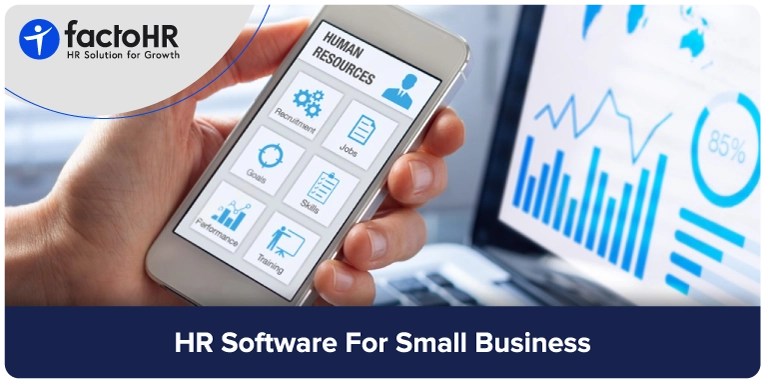HR Software for Small Businesses (SMBs) & SMEs

Table of Contents
Running a small business means juggling many roles and wearing multiple hats, which can make it hard for employees to focus on the creative stuff that really matters. That is where an HR software comes in handy for small businesses. It handles tedious everyday tasks like payroll, attendance tracking, and performance reviews.
This allows HR professionals and, in turn, the workforce to step out of these repetitive duties and instead dive right into growing the business or brainstorming new ideas. Additionally, HR software for small business effectively handles all the essentials so everything can be monitored and run smoothly while the staff focuses on doing the work they enjoy.
Why does your Business need an HR Software?
In the competitive business world, employee efficiency and time management are crucial for SMEs and SMBs to sustain themselves progressively. HR software for small business improves workforce productivity, supports business growth, and is scalable, leading to making data-driven decisions. The HRMS software for small businesses in India helps them compete with large enterprises.
The manual HRMS solution for SMEs and SMBs is time-consuming, prone to error, and not cost-effective. Therefore, HRMS software is crucial to processing HR operations. It enhances workforce management, helping businesses concentrate more on operational growth.

How do you Know when your Small Business Needs an HR Solution?
Small businesses often require an HR system to address and overcome all the gaps in their current HR management. Some of the crucial indications that small businesses have to focus on are mentioned below:
- The constant administrative burden can be crushing and decrease overall productivity. Introducing HR software for small business reduces this hassle and helps improve efficiency. Automating routine HR tasks can also positively affect team morale.
- A high turnover also indicates the need for an HR solution. It shows a lack of employee engagement and satisfaction, which HRMS solutions could rectify by enhancing communication through surveys and feedback.
- Excel spreadsheets for analytics can generate records incorrectly. Using the best HR software for small business can boost accuracy and provide a clear understanding of bottlenecks through intuitive reports.
- Legal compliances, laws, and regulations can be difficult to manage for small businesses without HR solutions, as they can change frequently.
- Accessing employee information can be time-consuming when the data is not centralized. An HR system assists with monitoring employee performance and accessing their records easily and quickly.
- The paperwork and maintenance of onboarding employees are always complicated, and errors are a real possibility, specifically when storing employee information. The presence of Human resource software eases the onboarding process and allows easy access to information whenever required, without consuming more time.
- The gap between employees and HR professionals regarding employee engagement and communication is difficult to bridge due to manual HR operations. The automated management process by the HR system allows employees to be more trusting while reducing absenteeism.
- When a business grows, HR operations become complex and more prone to errors. HR software enhances automated processes that can handle these issues and allow access to management records without burdens.
What Benefits does Best HR Software bring to Small and Medium Businesses (SMBs)?
Implementing HR solutions has numerous benefits for SMEs and SMBs. Some of them are:
- The centralized data management supports access to employee information and reduces data loss or errors.
- HR systems automate administrative work and enhance employee efficiency, including payroll processes, performance management, attendance, and travel management.
- Automated data entry provided by human resource software for small business reduces labor costs.
- Improved compliance with HR management software keeps organizations aligned with updated laws and regulations, which avoids legal penalties.
- Employee self-service portal reduces administrative work as employees can access and update their personal information.
- A real-time data-driving system supports informed decision-making.
- The scalability of HR software allows businesses to update features without interruptions.
- It enhances employee engagement via communication tools.
What are the Key Features of HR Systems for Small Startups
HRMS includes various features programmed to streamline the HR process. Though all the features are valuable, they might not be helpful for small businesses. The key features of hr systems for small startups are:
- Centralized employee data helps with employee records and enhances data protection and security.
- The HRMS solutions offer tools that manage the Recruitment, Onboarding, and Offboarding process.
- The software automates all payroll-related processes.
- The HR management software for small businesses in India maintains attendance and tracks employees’ working hours.
- The performance management system enhances the setting of employee goals, tracking development progress, and providing feedback.
- The HRMS software deals with health insurance, retirement plans, and other perks. Learning Management.
- It tracks employees’ progress, identifies skill gaps, and ensures professional growth in the workforce.
- ESS portals assist employees in updating and managing their personal information independently.
- Analytics and Reporting feature provides real-time reports and analytics for informed decision-making.
- Employee management software for small business helps organizations adhere to labor laws and regulations.

How do you choose the Best HR Software for your Small Business?
You can find multiple compatible HR solutions based on your business size and current requirements. Scalability is one of the most significant features to look for in HR software for small businesses just starting out their journeys. The software should also align with long-term business goals, boost productivity while staying under budget, and provide customer support.
What is the Best HR Software for Small Businesses?
The best HR software for small businesses eases administrative and management work. The HR system can simplify processes from onboarding to offboarding an employee. Among all the available options, factoHR is one of the best HR software for SMEs and SMBs, as it increases business growth and efficiency. Customers can experience a 70% increase in employee engagement and improvement. It also helps streamline the entire payroll process without errors.
How Much does the HR Solution Cost for Small Businesses?
The cost of HR solutions may vary based on their features and streamlined functions. Before purchasing any HR solutions, businesses must check the prices. The functions of the HR management software vary according to the cost. The average price of HR software starts from ₹40 to ₹450 per user per month.
Grow your business with factoHR today
Focus on the significant decision-making tasks, transfer all your common repetitive HR tasks to factoHR and see the things falling into their place.

© 2026 Copyright factoHR


